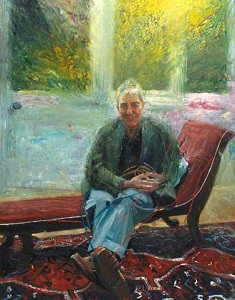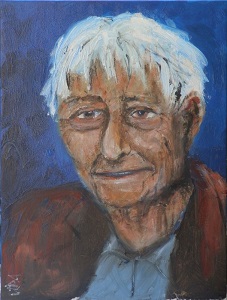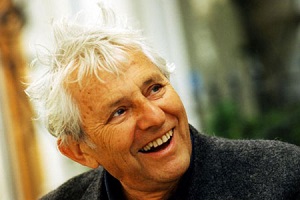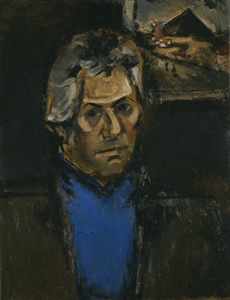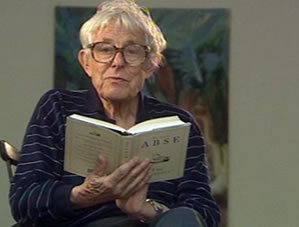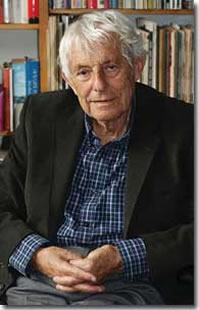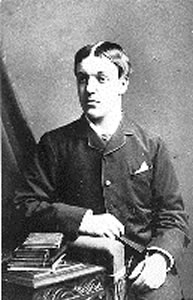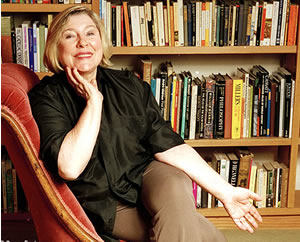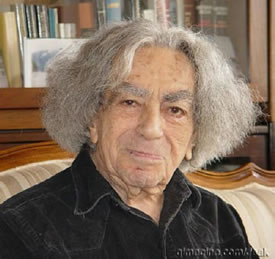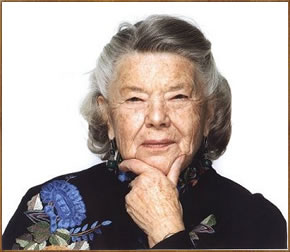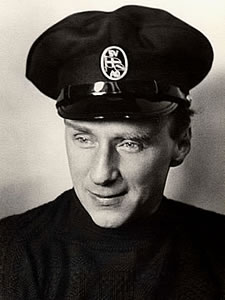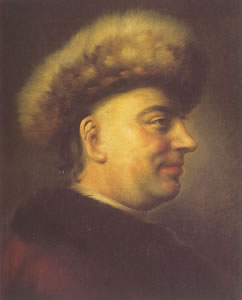De Britse dichter en schrijver Dannie Abse werd geboren op 22 september 1923 in Cardiff, Wales.
MYSTERIËN
’s Nachts, weet ik niet wie ik ben
als ik droom, als ik slaap.
Wakker geworden, houd ik mijn adem in en luister:
een duimnagel krast over de andere kant van de muur.
’s Middags ga ik een zonverlichte kamer binnen
en neem er waar dat er zonder enige reden de lamp brandt.
Ik hoorde nu wel te weten dat je weinig octaven kunt horen,
dat een visioen sterft als je er te lang naar staart;
dat zelfs de hele geboekstaafde geschiedenis
maar wat geklets is in een grote stilte;
dat een magnesiumflits nog niet één enkel moment
het onzichtbare kan verlichten.
Ik klaag niet. Ik ga uit van het zichtbare
en het zichtbare ontstelt mij.
Vertaald door: C. Buddingh
The Game
Follow the crowds to where the turnstiles click.
The terraces fill. Hoompa, blares the brassy band.
Saturday afternoon has come to Ninian Park
and, beyond the goalposts, in the Canton Stand
between black spaces, a hundred matches spark.
Waiting, we recall records, legendary scores:
Fred Keenor, Hardy, in a royal blue shirt.
The very names, sad as the old songs, open doors
before our time where someone else was hurt.
Now like an injured beast, the great crowd roars.
The coin is spun. Here all is simplified
and we are partisan who cheer the Good,
hiss at passing Evil. Was Lucifer offside?
A wing falls down when cherubs howl for blood.
Demons have agents: the Referee is bribed.
The white ball smacked the crossbar. Satan rose
higher than the others in the smoked brown gloom
to sink on grass in a ballet dancer’s pose.
Again, it seems, we hear a familiar tune
not quite identifiable. A distant whistle blows.
Memory of faded games, the discarded years;
talk of Aston Villa, Orient and the Swans.
Half-time, the band played the same military airs
as when The Bluebirds once were champions.
Round touchlines the same cripples in their chairs.
Mephistopheles had his joke. The honest team
dribbles ineffectually, no one can be blamed.
Infernal backs tackle, inside forwards scheme,
and if they foul us need we be ashamed?
Heads up! Oh for a Ted Drake, a Dixie Dean.
‘Saved’ or else, discontents, we are transferred
long decades back, like Faust must pay the fee.
The Night is early. Great phantoms in us stir
as coloured jerseys hover, move diagonally
on the damp turf, and our eidetic visions blur.
God sign our souls! Because the obscure Staff of
Hell rule this world, jugular fans have guessed
the result half way through the second half
and those who know the score just seem depressed.
Small boys swarm the field for an autograph.
Silent the Stadium. The crowds have all filed out.
Only the pigeons beneath the roofs remain.
The clean programmes are trampled underfoot
and natural the dark, appropriate the rain
Whilst, under lampposts, threatening newsboys shout.
Dannie Abse (Cardiff, 22 september 1923)
De Nederlandse schrijver Lodewijk van Deyssel werd geboren op 22 september 1864 in Amsterdam.
Uit: Rouwviolen
“Het weemoedige Sint-Niklaas-geschenk, waarmede mej. Swarth dezen winter Nederland heeft verrast – verleden jaar waren het de Sneeuwvlokken – is, eenigszins on-stelselmatig, verdeeld in Rouwviolen, Sonnetten en Balladen. De Rouwviolen zijn het voornaamste deel van dezen bundel, zij vormen éen geheel en zijn variëerende melodieën op éen zelfde thema, de Sonnetten en Balladen zijn een toegift, buiten verband met de Rouwviolen en zonder onderling verband.
Laten we nu beginnen met de Rouwviolen. Men kan dat echter niet doen zonder aarzeling. Het is werkelijk in ’t geheel niet te verwonderen, dat er in de pers zoo getalmd is met het leveren eener ernstige bespreking van deze gedichten. Men staat hier voor een vraagstuk, dat eene bijna boven-menschelijke kieschheid in de behandeling vereischt en een keizer in takt zou die letterkundige sultan mogen heeten, die, zonder in ’t minst den goeden smaak of den goeden toon te kwetsen, den sluijer van de door deze gedichten heen schemerende vrouwenfiguur zou weten af te lichten… Het is moeilijk gracieus te blijven en toch aan een ongehuwde dame te vragen: juffrouw, is u vier-en-dertig of acht-en-dertig jaar? Men doet dit ook niet-in een salon, maar een officiëerende ambtenaar van den burgerlijken-stand is wel eens verplicht zulke vragen te doen, en zóo is het ook gesteld met den ambtenaar van dien alles-behalve burgerlijken, van dien veel eer vorstelijken stand, dien men kunst-kritikus noemt. Die heeft slechts nauwkeurig te onderzoeken en naar waarheid mede te deelen, zonder er op te letten of de wrevelblos der bezeerde klein-menschelijke ijdelheid ook voor een oogenblik het aantal rimpels vermindert dat de kritikus konstateert als door een lange jeugd van heeten angstigen hartstocht in het gelaat van den kunstenaar gesneden.
De vrouw, die spreekt en zingt in de Rouwviolen, is in dien levenstijd, dien men de tweede-jeugd der vrouw zou kunnen noemen. Dit merkt men hieraan, dat de Geliefde, de in bevende passie aanbeden Mannenfiguur, dien men in de vroegere gedichten der kunstenares ontmoet, door al de verheerlijkende vervormingen heen, waarin haar Fantazie hem in de op-een-volgende tijden heeft gezien, thans geworden is: een ‘kind’:
Maar gij waart nog een knaap en ik was al een vrouw,
O, kindje, mijn kindje, wat waren wij dom!
enz. Dit is het liefde-gevoel, dat de passiën-cyclus van de eerste levenshelft der vrouwen die aan hoogere liefde doen, pleegt te besluiten, het liefde-gevoel hunner tweede-jeugd, bevattend eene vereeniging van de minnaressen- en van de moederliefde, die zij in zich hebben. Is zoo eene vrouw daarbij een hoog-begaafde dichteres, dan zal dat gevoel zich uiten in gedichten, als die welke hier besproken worden.”
Lodewijk van Deyssel (22 september 1864 – 26 januari 1952)
De Britse schrijfster Fay Weldon werd geboren op 22 september 1931 in Alvechurch, Engeland.
Uit: Jane Austen And the Pride Of Purists
“But he has nothing to recommend him but himself,” says Lady Russell, tart and astonished, in the seductively pleasurable film of Jane Austen’s novel “Persuasion,” which opened late last month in New York. Thus Lady Russell (Susan Fleetwood) seeks to dismiss gallant Captain Wentworth (Ciaran Hinds) from the affections of lovelorn Anne Elliot (Amanda Root). What, no money, no title, no connections — just himself? While the audience sighs in rapture at the old-fashioned prospect of love triumphing over likelihood.
Likewise, of course, Jane Austen has little on the surface to recommend her. A spinster lady from the English shires, a vicar’s daughter who never left home if she could help it, dead since 1817 — no money, no title, no connections — what can she have to offer? Just herself and six novels, which in the 1990’s have suddenly become the feverish obsession of film makers. These days we mine the past for plot and characters, in much the same way as we drill ancient rock for oil. And why not? There’s good stuff to be found down there, and good profit if we strike lucky.
“Sense and Sensibility,” with Emma Thompson and Hugh Grant, follows “Persuasion” to the United States in December; the Arts & Entertainment Network will show the BBC’s new “Pride and Prejudice” in January (thus replacing my own 1985 version, I remark, as graciously as I can); “Emma,” with Gwyneth Paltrow and Jeremy Northam, is in production, and “Clueless,” the Alicia Silverstone comedy, shamelessly based on “Emma,” opened in July. Austen fever, indeed.
All, of course, have a guaranteed audience in a world increasingly bored by “Pulp Fiction,” “True Lies” and special effects, an audience that would rather just sit quietly and look at something nice that is not going to explode and shatter the nerves. Something that you can take the kids to, and hope to educate them just a bit. A little dose of English heritage as an antidote to CNN. See, child, the world isn’t all Bosnia, O. J. and Bruce Willis. It’s love as well, not to mention personal responsibility, long-term goals and delicacy of response, that kind of stuff. Didn’t you just love “Little Women”? At least in those days everyone had manners. What’s wrong with Laura Ashley if the alternative is CK ads? And Levi Strauss? Let’s just look, and learn, and trust and love impossibly. Please. The past is preferable to now.”
Fay Weldon (Alvechurch, 22 september 1931)
Zie voor de drie bovenstaande schrijvers ook mijn blog van 22 september 2006 en ook mijn blog van 22 september 2007 en mijn blog van 22 september 2008.
De Britse schrijfster Rosamunde Pilcher werd op 22 september 1924 geboren in Lelant, Cornwall, Groot-Brittannië. Haar eerste verhaal werd gepubliceerd in het blad ‘Women and Home’ toen ze achttien was. Na haar schooltijd leerde ze stenografie en typen bij het chique Londense ‘Secretarial College’. Tijdens WO II werkte ze eerst als secretaresse op het Engelse departement van Buitenlandse zaken en later meldde zij zich dan vrijwilligster aan bij de koninklijke marine om te dienen bij The Womans Royal Naval Service. Na een volledige militaire opleiding in Portsmouth, waar haar ook geleerd wordt hoe ze met wapens om moet gaan, wordt ze in Sri Lanka (nu: Sri Lanka) gestationeerd bij de West-India Fleet.
Kort na de oorlog ontmoette ze de Schotse officier Graham Pilcher. Ze trouwden in december 1946 en verhuisden naar Schotland. Ook tijdens de opvoeding van haar kinderen is Rosamunde Pilcher blijven schrijven, zowel verhalen voor tijdschriften als dertien romans en zelfs enkele toneelstukken. Rosamunde Pilcher brak door met het boek De schelpenzoekers, dat inmiddels over de gehele wereld is vertaald en miljoenen lezers bereikte. Rosamunde Pilcher is vandaag vijfentachtig jaar geworden.
Uit: Elfrida
“Before Elfrida Phipps left London for good and moved to the country, she made a trip to the Battersea Dogs’ Home, and returned with a canine companion. It took a good-and heart-rending-half-hour of searching, but as soon as she saw him, sitting very close to the bars of his kennel and gazing up at her with dark and melting eyes, she knew that he was the one. She did not want a large animal, nor did she relish the idea of a yapping lap-dog. This one was exactly the right size. Dog size.
He had a lot of soft hair, some of which fell over his eyes, ears that could prick or droop, and a triumphant plume of a tail. His colouring was irregularly patched brown and white. The brown bits were the exact shade of milky cocoa. When asked his ancestry, the kennel maid said she thought there was Border collie there, and a bit of bearded collie, as well as a few other unidentified breeds. Elfrida didn’t care. She liked the expression on his gentle face. She left a donation for the Battersea Dogs’ Home, and her new companion travelled away with her, sitting in the passenger seat of her old car and gazing from the window in a satisfied fashion, as though this were the life to which he was happy to become accustomed.
The next day, she took him to the local Poodle Parlour for a cut, shampoo, and blow-dry. He returned to her fluffy and fresh and smelling sweetly of lemonade. His response to all this sybaritic attention was a show of faithful, grateful, and loving devotion. He was a shy, even a timid, dog, but brave as well. If the doorbell rang, or he thought he spied an intruder, he barked his head off for amoment and then retreated to his basket, or to Elfrida’s lap. It took some time to decide on a name for him, but in the end she christened him Horace.”
Rosamunde Pilcher (Lelant, 22 september 1924)
De Hongaarse dichter en schrijver György Faludy werd geboren op 22 september 1910 in Boedapest. Bekend werd hij in de jaren dertig door zijn veraling van de balladen van Francois Villon. In 1938 trok hij naar Parijs, maar na de bezetting van Frankrijk door de Duitsers kwam hij in de VS terecht. In 1946 keerde hij terug naar Hongarije en begon hij te werken voor de krant Népszava (De Stem van het Volk), een krant van de sociaal-democraten. In 1950 werd hij gearresteerd voor dissidente activiteiten. Na de neergeslagen opstand van 1956 vluchtte hij naar Londen. Daar schreef hij zijn bekendste werk Mijn gelukkige dagen in de hel. Vanaf 1967 doceerde hij aan de universiteit van Toronto, terwijl hij daarnaast bleef schrijven. In 1994 ontving hij de meest prestigieuze Hongaarse prijs, de Kossuth prijs, voor zijn werk.
Learn by Heart This Poem of Mine
Learn by heart this poem of mine;
books only last a little time
and this one will be borrowed, scarred,
burned by Hungarian border guards,
lost by the library, broken-backed,
its paper dried up, crisped and cracked,
worm-eaten, crumbling into dust,
or slowly brown and self-combust
when climbing Fahrenheit has got
to 451, for that’s how hot
your town will be when it burns down.
Learn by heart this poem of mine.
Learn by heart this poem of mine.
Soon books will vanish and you’ll find
there won’t be any poets or verse
or gas for car or bus – or hearse –
no beer to cheer you till you’re crocked,
the liquor stores torn down or locked,
cash only fit to throw away,
as you come closer to that day
when TV steadily transmits
death-rays instead of movie hits
and not a soul to lend a hand
and everything is at an end
but what you hold within your mind,
so find a space there for these lines
and learn by heart this poem of mine.
Learn by heart this poem of mine;
recite it when the putrid tides
that stink of lye break from their beds,
when industry’s rank vomit spreads
and covers every patch of ground,
when they’ve killed every lake and pond,
Destruction humped upon its crutch,
black rotting leaves on every branch;
when gargling plague chokes Springtime’s throat
and twilight’s breeze is poison, put
your rubber gasmask on and line
by line declaim this poem of mine.
Learn by heart this poem of mine
so, dead, I still will share the time
when you cannot endure a house
deprived of water, light, or gas,
and, stumbling out to find a cave,
roots, berries, nuts to stay alive,
get you a cudgel, find a well,
a bit of land, and, if it’s held,
kill the owner, eat the corpse.
I’ll trudge beside your faltering steps
between the ruins’ broken stones,
whispering “You are dead; you’re done!
Where would you go? That soul you own
froze solid when you left your town.”
Learn by heart this poem of mine.
Maybe above you, on the earth,
there’s nothing left and you, beneath,
deep in your bunker, ask how soon
before the poisoned air leaks down
through layers of lead and concrete. Can
there have been any point to Man
if this is how the thing must end?
What words of comfort can I send?
Shall I admit you’ve filled my mind
for countless years, through the blind
oppressive dark, the bitter light,
and, though long dead and gone, my hurt
and ancient eyes observe you still?
What else is there for me to tell
to you, who, facing time’s design,
will find no use for life or time?
You must forget this poem of mine.
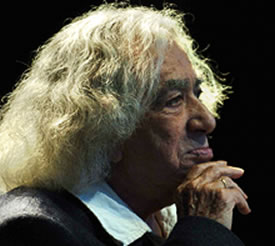
György Faludy (22 september 1910 – 1 september 2006)
Zie voor onderstaande schrijver ook mijn blog van 22 september 2008.
De Duitse dichter en schrijver Hans Leip werd geboren op 22 september 1893 in Hamburg.
